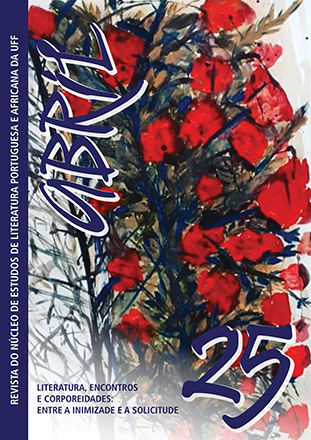João Melo e a poética da violência: breve análise da obra Autorretrato
DOI:
https://doi.org/10.22409/abriluff.v12i25.43128Palavras-chave:
João Melo, Poesia, Violência, Pós-Colonialismo, Resistência.Resumo
Reconhecido contemporaneamente pela crítica especializada como marco da poesia angolana pós-independência, e ainda pouco lido no Brasil, o poeta João da Silva Melo, nascido em 1955, em Luanda, Angola, entra para a literatura canônica de seu tempo com uma obra que, aparentemente alienada do Realismo, irá se mostrar via de denúncia social por meio de uma sofisticada estética. A ideia central deste artigo é propor uma focalização mais atenta, entre os vários temas suscitados pelo poeta, para a importância da violência como tópico da representação do cotidiano angolano em sua condição de país periférico. Contribuem para a reflexão críticos como Seligmann-Silva (1999), especialmente na compreensão do testemunho e da ironia vistos em Autorretrato (2007). Neste diálogo, também se apresenta como relevante para o entendimento da obra de Melo e seu caráter de resistência a Dialética negativa, de Theodor Adorno (2018).
Downloads
Downloads
Publicado
Edição
Seção
Licença
Copyright (c) 2020 Abril – NEPA / UFF

Este trabalho está licenciado sob uma licença Creative Commons Attribution-NonCommercial 4.0 International License.
Autorizo a Revista Aabril - NEPA/UFF a publicar o artigo que ora submeto, de minha autoria/responsabilidade, caso seja aceito para publicação online. Declaro, ainda, que esta contribuição é original, que não está sendo submetida a outro editor para publicação, e assino a presente declaração como expressão da verdade.
Os trabalhos publicados no espaço virtual da Revista Abril serão automaticamente cedidos, ficando os seus direitos autorais reservados à Revista Abril. Sua reprodução, total ou parcial, é condicionada à citação dos autores e dos dados da publicação.

A Revista Abril utiliza uma Licença Creative Commons - Atribuição-NãoComercial 4.0 Internacional (CC BY-NC 4.0).









